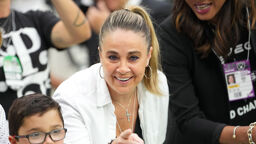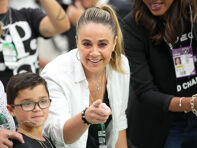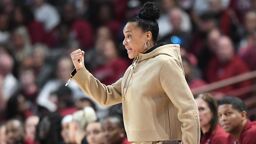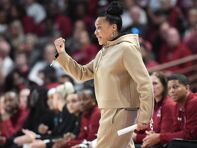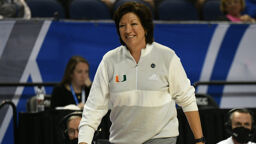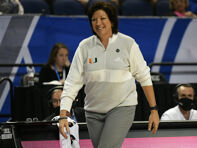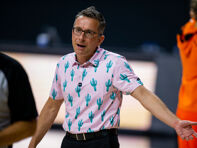With the NCAA women's Final Four underway, ESPN has produced an exhaustive story that looks at the dwindling number of women coaching women's college teams (it's down from a high of 90% in 1970 to 42.9% now). Sexism plays a huge role in it, with women finding it hard to get second jobs after they've lost one (not true of men). So does homophobia, the reporting by Kate Fagan and Luke Cyphers finds, citing Outsports' 2011 Persons of the Year, Pat Griffin and Helen Carroll.
"When you look at the decline in the percentage of women coaches," says Helen Carroll, of the National Center for Lesbian Rights, "sexual orientation has a lot to do with it."
Homophobia has haunted women's sports throughout the Title IX era, forcing coaches to stay closeted for fear of losing their jobs, or at least recruits. In some quarters, coaches have been known to signal quietly to prospects or their parents that a competing program is run by a lesbian, in an effort to turn the recruit away.
To this day, there is only one out lesbian coach in Division I basketball, Portland State's Sherri Murrell. In a 2009 paper on negative recruiting, Carroll and Pat Griffin, of the Women's Sports Foundation, wrote, "The psychological toll of silence, denial and secrecy results in a climate of fear and hostility that many lesbian, gay and bisexual coaches endure in order to pursue their profession. Others simply choose to leave the profession."
It's not only established coaches who check out. Former players often decide the hassle isn't worth it. Two former collegiate stars, Sue Wicks of Rutgers and Abby Conklin of Tennessee, told ESPN The Magazine in 2011 that homophobia still casts a wide shadow over the sidelines. In the same story, former WNBA star Kate Starbird stressed that she wouldn't consider coaching because she refused to be closeted. "I didn't want to live my life that way," she said.
The homophobia angle is just one part of this important and timely story ESPN calls "The Glass Wall." It refers to the reality that men can get jobs coaching both males and females, while women only land jobs coaching females and can only watch as they have virtually no chance to land a men's job. It includes this surprising statistic: "Since 2000, NCAA programs have added 1,774 women's head coaching jobs. Men have filled 1,220 of the openings." That's the opposite of progress despite the increased visibility of women in collegiate sports. "Coaching is a man's world," the story concludes.
With the NCAA women's Final Four underway, ESPN has produced an exhaustive story that looks at the dwindling number of women coaching women's college teams (it's down from a high of 90% in 1970 to 42.9% now). Sexism plays a huge role in it, with women finding it hard to get second jobs after they've lost one (not true of men). So does homophobia, the reporting by Kate Fagan and Luke Cyphers finds, citing Outsports' 2011 Persons of the Year, Pat Griffin and Helen Carroll.
"When you look at the decline in the percentage of women coaches," says Helen Carroll, of the National Center for Lesbian Rights, "sexual orientation has a lot to do with it."
Homophobia has haunted women's sports throughout the Title IX era, forcing coaches to stay closeted for fear of losing their jobs, or at least recruits. In some quarters, coaches have been known to signal quietly to prospects or their parents that a competing program is run by a lesbian, in an effort to turn the recruit away.
To this day, there is only one out lesbian coach in Division I basketball, Portland State's Sherri Murrell. In a 2009 paper on negative recruiting, Carroll and Pat Griffin, of the Women's Sports Foundation, wrote, "The psychological toll of silence, denial and secrecy results in a climate of fear and hostility that many lesbian, gay and bisexual coaches endure in order to pursue their profession. Others simply choose to leave the profession."
It's not only established coaches who check out. Former players often decide the hassle isn't worth it. Two former collegiate stars, Sue Wicks of Rutgers and Abby Conklin of Tennessee, told ESPN The Magazine in 2011 that homophobia still casts a wide shadow over the sidelines. In the same story, former WNBA star Kate Starbird stressed that she wouldn't consider coaching because she refused to be closeted. "I didn't want to live my life that way," she said.
The homophobia angle is just one part of this important and timely story ESPN calls "The Glass Wall." It refers to the reality that men can get jobs coaching both males and females, while women only land jobs coaching females and can only watch as they have virtually no chance to land a men's job. It includes this surprising statistic: "Since 2000, NCAA programs have added 1,774 women's head coaching jobs. Men have filled 1,220 of the openings." That's the opposite of progress despite the increased visibility of women in collegiate sports. "Coaching is a man's world," the story concludes.




